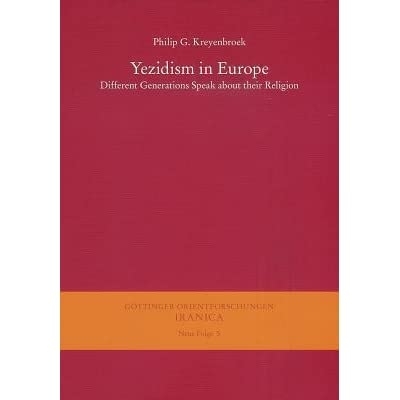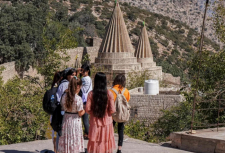Yezidism in Europe Different Generations Speak about their Religion

Preface
Part-1
The Yezidis are a religious minority group originating in the Middle East, whose shared language is Kurmanji-Kurdish. Yezidis now live in Northern Iraq, Eastern Turkey, Syria, Armenia, Georgia, and as Diaspora communities in Western Europe, mainly in Germany, and in Russia, Ukraine and other states that used to be part of the Soviet Union. The Yezidis do not identify with Islam, regarding themselves as members of a separate religion. Many of their neighbours erroneously believe that they worship the devil, and therefore regard them with suspicion. As a result, the Yezidis in the homelands have often been targets of violence and discrimination, particularly from Moslems, and have generally kept themselves apart from other communities. A number of Yezidi tribes from Turkey sought refuge from such persecutions in the Christian lands of the Caucasus, in present-day Armenia and Georgia, in the course of the 19th and early 20th centuries. As they continued to regard Eastern Anatolia as their true homeland, retained their communal identity, and did not seek to assimilate to the local culture, these groups could be said to constitute the first Yezidi Diaspora.
After the collapse of the Soviet Union in 1991, with all this entailed for the economies of some of the former Soviet Republics, many Yezidis emigrated from Armenia and Georgia, mainly to Russia and the Ukraine, thus creating a second-stage Diaspora which looks to Armenia and Georgia for guidance in all religious.
By Philip G. Kreyenbroek in collaboration with Z. Kartal, Kh. Omarkhali, and Kh. Jindy Rashow
Tags: #yazidisinfo #newsyazidi #aboutyazidi #ezidi
Yezidism in Europe Different Generations Speak about their Religion

Preface
Part-1
The Yezidis are a religious minority group originating in the Middle East, whose shared language is Kurmanji-Kurdish. Yezidis now live in Northern Iraq, Eastern Turkey, Syria, Armenia, Georgia, and as Diaspora communities in Western Europe, mainly in Germany, and in Russia, Ukraine and other states that used to be part of the Soviet Union. The Yezidis do not identify with Islam, regarding themselves as members of a separate religion. Many of their neighbours erroneously believe that they worship the devil, and therefore regard them with suspicion. As a result, the Yezidis in the homelands have often been targets of violence and discrimination, particularly from Moslems, and have generally kept themselves apart from other communities. A number of Yezidi tribes from Turkey sought refuge from such persecutions in the Christian lands of the Caucasus, in present-day Armenia and Georgia, in the course of the 19th and early 20th centuries. As they continued to regard Eastern Anatolia as their true homeland, retained their communal identity, and did not seek to assimilate to the local culture, these groups could be said to constitute the first Yezidi Diaspora.
After the collapse of the Soviet Union in 1991, with all this entailed for the economies of some of the former Soviet Republics, many Yezidis emigrated from Armenia and Georgia, mainly to Russia and the Ukraine, thus creating a second-stage Diaspora which looks to Armenia and Georgia for guidance in all religious.
By Philip G. Kreyenbroek in collaboration with Z. Kartal, Kh. Omarkhali, and Kh. Jindy Rashow
Tags: #yazidisinfo #newsyazidi #aboutyazidi #ezidi


























